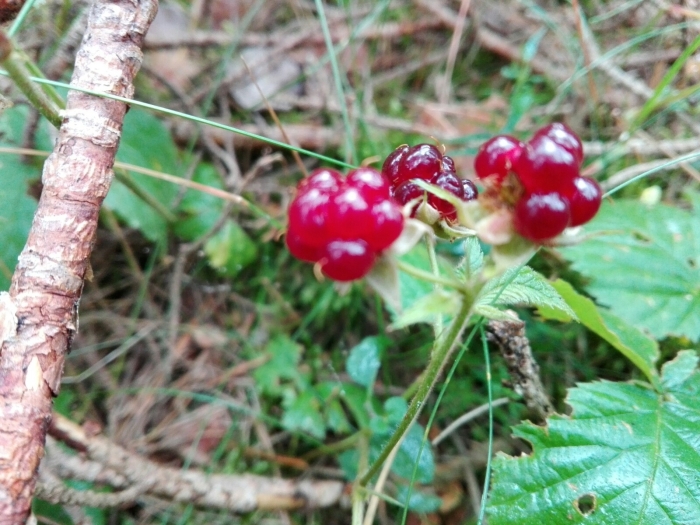Stone Bramble
(Rubus saxatilis)
Stone Bramble (Rubus saxatilis)
/
/

Ewa Olchanowska
CC BY 4.0
Image By:
Ewa Olchanowska
Recorded By:
Copyright:
CC BY 4.0
Copyright Notice:
Photo by: Ewa Olchanowska | License Type: CC BY 4.0 | License URL: http://creativecommons.org/licenses/by/4.0/ | Rights Holder: Ewa Olchanowska | Publisher: iNaturalist | Date Created: 42960 |

























Estimated Native Range
Summary
Rubus saxatilis, commonly known as Stone Bramble, is a perennial herb native to a variety of habitats including damp deciduous woodlands, forest clearings, and rough scrubland across Europe and Asia, from Iceland and Spain east to China, and is also found in Greenland. It typically grows 8-24 inches tall with green stems that bear minute needle-like prickles. The leaves are trifoliate, meaning they are usually compound with three leaflets. Stone Bramble produces small, spherical red fruit that is about 0-1 inch in diameter, which ripens in late summer. The flowers are small, white, and not particularly showy, but the red berries are quite decorative.
Stone Bramble is valued for its edible berries, which are used in various culinary preparations such as jams and desserts. It is also appreciated for its ability to spread by runners, making it useful as a ground cover in garden settings. In cultivation, it prefers moist, well-drained soils and can tolerate partial shade, although it will produce more fruit in full sun. While it is not commonly used in large-scale landscaping, it can be an attractive addition to woodland gardens or naturalized areas. Gardeners should be aware that it can spread vigorously and may require management to keep it within bounds. It is generally disease-resistant but can be susceptible to fungal leaf diseases in wet conditions.CC BY-SA 4.0
Stone Bramble is valued for its edible berries, which are used in various culinary preparations such as jams and desserts. It is also appreciated for its ability to spread by runners, making it useful as a ground cover in garden settings. In cultivation, it prefers moist, well-drained soils and can tolerate partial shade, although it will produce more fruit in full sun. While it is not commonly used in large-scale landscaping, it can be an attractive addition to woodland gardens or naturalized areas. Gardeners should be aware that it can spread vigorously and may require management to keep it within bounds. It is generally disease-resistant but can be susceptible to fungal leaf diseases in wet conditions.CC BY-SA 4.0
Plant Description
- Plant Type: Shrub
- Height: 1-1.5 feet
- Width: 1-1.5 feet
- Growth Rate: Moderate
- Flower Color: N/A
- Flowering Season: Spring, Summer
- Leaf Retention: Deciduous
Growth Requirements
- Sun: Full Sun, Part Shade
- Water: Medium
- Drainage: Medium, Fast
Common Uses
Bee Garden, Edible*Disclaimer: Easyscape's listed plant edibility is for informational use. Always verify the safety and proper identification of any plant before consumption., Low Maintenance
Natural Habitat
Damp deciduous woodlands, forest clearings, and rough scrubland
Other Names
Common Names: Stone Bramble, Wild Raspberry, Rock Bramble
Scientific Names: , Rubus saxatilis, Cylactis saxatilis, Idaeobatus saxatilis, Rubus americanus, Rubus clarkei, Rubus fragaria, Rubus ruber, Rubus saxatilis, Rubus saxatilis f. multiloba
GBIF Accepted Name: